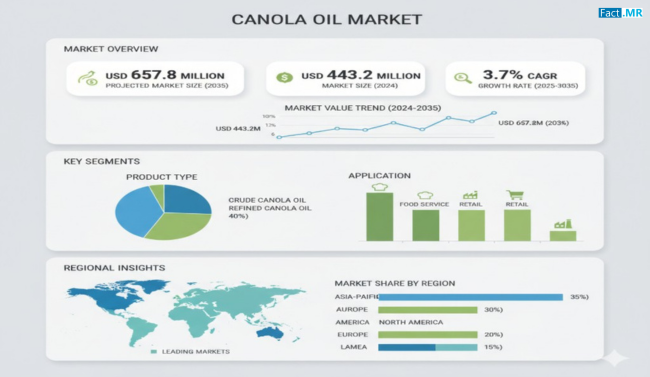The canola oil market is witnessing significant growth as consumers increasingly prioritize healthy, versatile, and sustainable cooking oils. Canola oil, renowned for its low saturated fat content and beneficial fatty acids, has become a preferred choice for households, foodservice providers, and industrial food manufacturers. Rising health awareness, culinary innovations, and the adoption of plant-based ingredients are contributing to the expanding global demand for canola oil.
Market Overview:
Canola oil is extracted from the seeds of the canola plant and is highly valued for its neutral taste, high smoke point, and nutritional benefits. Its versatility makes it suitable for frying, baking, salad dressings, and various processed food applications.
The market is being driven by consumers seeking healthier cooking alternatives, coupled with the growing trend of functional foods that incorporate oils rich in omega-3 and omega-6 fatty acids. Manufacturers are also emphasizing high-quality, cold-pressed, and organic canola oil products to cater to the premium segment and health-conscious buyers.
Advancements in processing technology, including refining, bleaching, and deodorization, have improved the oil’s shelf life and flavor stability. These innovations, combined with branding strategies that highlight nutritional value, are driving adoption across multiple consumer and industrial segments.
Regional Insights:
North America represents a key market for canola oil, supported by widespread health awareness, high consumption of plant-based oils, and established food processing industries. Retail and e-commerce channels are also enabling convenient access to branded and premium canola oil products.
Europe is another significant market, characterized by high demand for organic and non-GMO canola oil. European consumers increasingly prefer oils that meet sustainability standards and carry clean-label certifications. The presence of well-established distribution networks and regulatory frameworks supporting quality assurance further drives market adoption.
Asia-Pacific is emerging as a major growth region due to increasing urbanization, rising disposable incomes, and shifting dietary preferences toward healthier cooking oils. Countries such as China, India, and Japan are witnessing higher demand for canola oil in households, restaurants, and industrial food processing.
Latin America and the Middle East & Africa are experiencing gradual growth, fueled by expanding awareness of healthy diets, culinary diversification, and improving access to quality vegetable oils. Local and imported canola oil options are gaining popularity in these regions.
Innovations and Regulatory Trends:
Innovation in the canola oil market focuses on product differentiation, health benefits, and sustainability. Cold-pressed, refined, and fortified oils are gaining popularity for their nutritional advantages and suitability across various culinary applications. Manufacturers are also experimenting with blended oils to enhance flavor profiles and functional benefits.
Sustainability and traceability are increasingly influencing the market. Producers are investing in eco-friendly cultivation, responsible sourcing, and energy-efficient processing techniques. Certifications such as organic, non-GMO, and sustainability labels are enhancing consumer trust and brand reputation.
Regulatory trends play a critical role in product quality and safety. Compliance with international food safety standards, labeling requirements, and permissible additive limits ensures market acceptance. Adherence to these standards also supports the expansion of canola oil in global export markets.
Key Trends & Forecast:
The canola oil market is shaped by several notable trends:
- Health and Wellness Focus: Rising consumer awareness of heart health, cholesterol management, and balanced diets is driving demand for canola oil.
- Organic and Non-GMO Products: Consumers increasingly prefer oils produced without synthetic chemicals or genetically modified seeds.
- Convenience and Packaging Innovations: Portion-controlled bottles, resealable packs, and eco-friendly packaging are improving usability and sustainability.
- Industrial and Foodservice Applications: The growing processed food sector is adopting canola oil for frying, baking, and ingredient formulations.
- Sustainability and Traceability: Environmentally conscious cultivation and transparent supply chains are becoming key differentiators for brands.
These trends highlight the market’s emphasis on health, sustainability, and convenience to meet evolving consumer expectations.
Applications & End-Use Outlook:
Canola oil is used across multiple sectors and applications, including:
- Household Cooking: Widely used for frying, baking, sautéing, and salad dressings due to its neutral flavor and high smoke point.
- Food Processing and Manufacturing: Incorporated in snacks, baked goods, margarine, sauces, and ready-to-eat meals for functional and nutritional benefits.
- Foodservice and Hospitality: Restaurants, catering services, and fast-food chains rely on canola oil for frying and cooking because of its consistency, taste neutrality, and health appeal.
- Nutraceutical and Functional Food Products: Canola oil is utilized in health-oriented formulations and dietary supplements for its beneficial fatty acids.
The versatility of canola oil across household, industrial, and commercial applications ensures its relevance in both consumer and professional settings.
Competitive Landscape:
The global canola oil market is highly competitive, with multinational corporations and regional producers striving to capture consumer attention. Product innovation, quality differentiation, sustainability initiatives, and branding are key strategies for maintaining market presence.
Companies are expanding production capabilities, sourcing high-quality seeds, and adopting environmentally responsible cultivation and processing methods. Strategic partnerships with retailers, e-commerce platforms, and foodservice providers are enabling wider distribution and brand visibility.
The focus on transparency, traceability, and health benefits is also driving competition, as brands aim to appeal to increasingly informed and health-conscious consumers.
Conclusion:
The canola oil market is poised for steady growth, driven by health-conscious consumer trends, innovations in processing and packaging, and expanding applications across household and industrial segments. As demand for functional, sustainable, and convenient cooking oils continues to rise, manufacturers and distributors that prioritize quality, nutrition, and eco-friendly practices will remain at the forefront of this dynamic market.
By aligning product development and marketing strategies with evolving dietary preferences and sustainability initiatives, companies can strengthen their presence in the global canola oil market and meet the growing demand for healthier culinary solutions.
Browse Full Report – https://www.factmr.com/report/98/canola-oil-market



